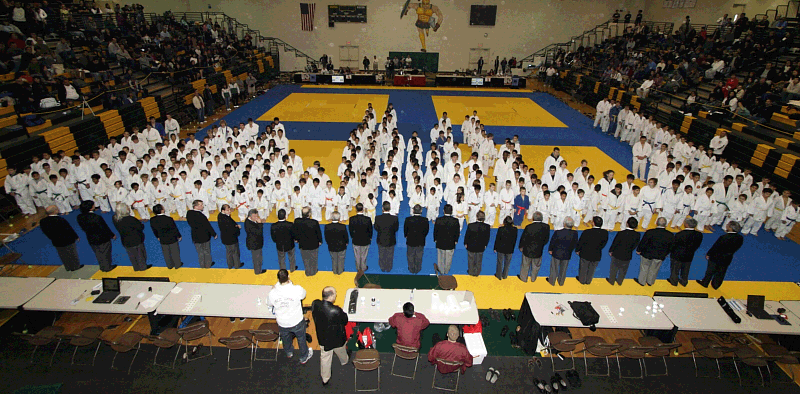
Growing Judo, December 2010
5th Anniversary USJA/USJF Winter Nationals
by Gary Goltz, USJA President

Sunday's Opening Ceremonies
The 5th Anniversary USJA/USJF Winter Nationals were held in Damien High School’s gym on December 4th & 5th 2010 in La Verne, California about 30 miles east of Los Angeles. There were about 500 competitors which was a 10% increase over the 2009 event. The categories included Seniors, Juniors, Masters, Novices, and Kata. This is a USJA/USJF Grassroots Judo™ supported event. On hand were the USJA’s Executive Director, Katrina Davis, its Board of Directors, as well as Neil Simon, President and Robert Fukuda, Executive Director of the USJF.
There was a coaching clinic held on December 3rd which was attended by over 30 coaches from all over the country. There was also a competitor’s clinic featuring Sauveur Soriano from France and Israel Hernandez from Cuba free to all participants. Renowned best-selling author Barry Eisler who is also a judoka was on hand to meet and greet his fans. USJA board member and donor of the year Dr. James Lally, Chief Medical Officer of Prime Health provided an experienced team of sports medicine physicians accustomed to working judo tournaments. Hayward Nishioka oversaw the officiating which included a half a dozen ‘A’ Level Referees. Kenji Osugi was in charge of the Kata Competition.

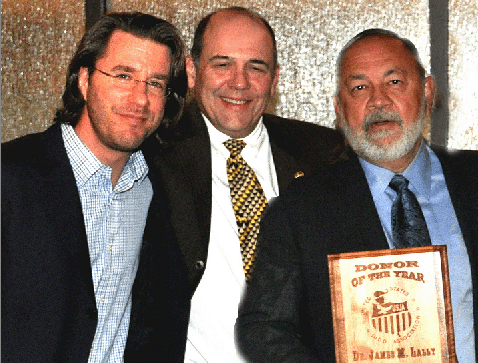
Barry Eisler receiving his 2nd degree black belt, Gary Goltz, & Dr. James Lally
Goltz Judo provided the majority of volunteers along with Empire Judo, Industry Sherriff’s Judo, and Discover Judo its sister USJA clubs. The event was coordinated using a state of the art scoreboard program developed by John Moe, the USJA’s volunteer IT Director, projected on 40” monitors donated by Dr. Lally. The pooling program used was developed by Tony Farah of Goltz Judo. Kenam’s Judo of Glendale, California won the Top Club Award. Complete results and photos from this year’s tournament as well as from all of the past years can be found on the Winter Nationals website.
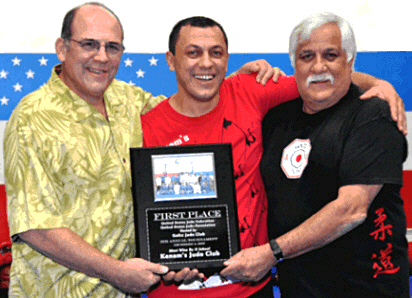
Kenam's Judo was the winner of Top Club Award
Daily Bulletin, November 26, 2010
National judo tournament slated at Damien High
by Imani Tate, Senior Staff Writer
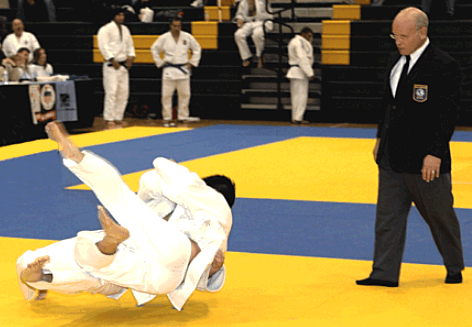
Photo by Gary Wagstaff
Two-time Olympic bronze medalist Israel Hernandez will be among the highlights of the fifth annual Winter Nationals Judo Tournament December 4th and 5th.
Thousands of judo experts, coaches, competitive athletes and fans are expected to attend the 2-day event at Damien High School in La Verne. The tournament is presented by the United States Judo Association and the United States Judo Federation, two organizations representing nearly 20,000 active American athletes. Judo matches involve skillful throws, holding and submission techniques.
Gary Goltz, founding sensei of Goltz Judo Dojo in Claremont and USJA president, said the tournament offers friendly competition and continues to satisfy the USJA/USJF goal of “building friendships and better people” through national and international judo programs.
Hernandez, 40, will conduct a clinic at 4:00 p.m. Saturday following the conclusion of competition for the day. Sauveur Soriano, a former French national and international competitor and an expert with full certification as a judo master instructor from the French Judo Federation, will serve as one of the tournament clinicians.
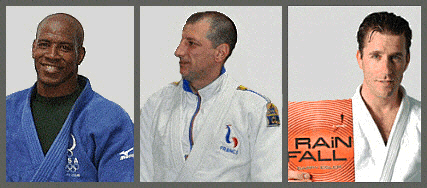
Israel Hernandez, Sauveur Soriano, & Barry Eisler scheduled to appear
Best-selling author Barry Eisler will also be among the special guests. Eisler will attend Saturday to autograph copies of “Rain Fall,” his fictional espionage account of the exploits of John Rain, a character with a black belt in judo like Eisler himself, Goltz said.
Hayward Nishioka serves as the head referee for the tournament featuring current members of the three national judo organizations. Athletes from 5-years-old to senior citizens will compete. Dr. James Lally and Chino Valley Medical Center provides on-site physicians. Aegis Ambulance Service of Monrovia provides on-site emergency medical technicians.
Hernandez was born in Santiago, Cuba in January 1970. Representing his homeland, he won bronze medals in the men’s half-lightweight judo categories at the 1992 Olympics in Barcelona, Spain and at the 1996 Olympics in Atlanta.
Hernandez additionally won a silver medal at the 1995 Pan American Games in Mar del Plata, and bronze medals at the 1991 and 1999 Pan American Games, respectively held in Havana and Winnipeg. In 2005, he and Jason Morris, the American silver medalist in the men’s half middleweight category at the 1992 Olympics, were named national coaches of the U.S. Olympic Judo Team.
To prepare American athletes for the 2008 Olympics in Beijing, USA Judo assembled a coaching team of world-class medalists.
Besides Hernandez and Morris, the judo dream team of coaches included Mike Swain, 1987 world champion and 1988 Olympics bronze medalist; Jimmy Pedro, 1989 world champion and two-time Olympic bronze medalist; Ed Liddie, 1984 Olympic bronze medalist and USA Judo athlete performance director; Pat Burris, two-time Olympian and USA Judo coaching education chairman; and Grace Jividen, 1992 Olympian.
The dream coaches additionally included Brett Barron, 1984 Olympian and 2004 Olympic team coach; Jim Hrbek, 1992 Olympic coach; Jhonny Prado, North Miami USA Judo national training site coach; Reno Reser, six-time National Championship medalist; and Lance Nading, USA Judo board director and three-time Nationals medalist.
“This is the first time ever that USA Judo has brought together all of these great minds in one room,” said Jose H. Rodriguez, USA Judo’s Chief Executive Officer. “Very few countries have taken the time to bring past successful athletes back to create future plans. I’m looking forward to this being a key component to our future success on the mat.”
As a member of this elite coaching staff, Hernandez coached world silver medalist Ronda Rousey to a historic bronze medal at the 2008 Olympics in Beijing.
Rousey became the first American woman to win a medal since females were allowed to compete as full-medal athletes in judo. She literally ran off the mat and leaped into Hernandez’s arms after she won five matches in the 70kg division with only one loss, reported an USA Judo newsletter. According to Goltz, judo is one of the most democratic and equitable sports in the world. It measures skill rather than judging according to race, culture, religion, gender, politics or national origins, he said.
“Judo is all about improving yourself, building your character and working with people from all over the world,” Goltz said.
“Because judo is very international, it brings together people in arenas worldwide.“You might not speak the same language, but you all speak the language of judo,” the seventh-degree black belt sensei said. “If everyone was involved in judo, the world would be a much better place.
“Judo is one of the most popular sports on the international level,” Goltz said. “In Europe, judo championships are televised. The French Judo Federation has over a half-million members and judo is the third most popular sport in France right behind soccer and tennis. In Cuba, judo is second only to baseball. In Asia, Africa, South America, the Netherlands and other European countries, it is a huge sport that attracts lots of enthusiasm and support.”
Landel to make second appearance at Winter Nationals
by Imani Tate, Senior Staff Writer
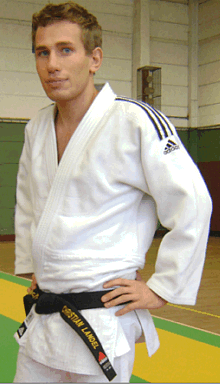
Christian Landel of France
One of the best ways to improve one's skills in judo is to face an opponent with better skills, according to second-degree black belt judo artist Christian Landel.
Landel, a French national who recently migrated to the United States, will join thousands of youth and adult martial artists at the United States Judo Association and United States Judo Federation fifth annual Winter Nationals.
Landel, 24, will make his second appearance at the tournament drawing participants and spectators from throughout the United States and world to La Verne's Damien High School on December 4th and 5th.
Unlike many sports with unfriendly opponents, the martial arts emphasize respect and friendship between "fighters," said Landel and USJA President Gary Goltz.
"You have to have a fighting spirit and like to fight to be successful in judo," Landel said. "You fight not to hurt or kill your opponent, but to improve your own skills. You're constantly comparing yourself to your opponent and because you respect him, you get better by watching him."
Goltz, a seventh-degree black belt and the founding sensei of Goltz Judo in Claremont, said the Winter Nationals promote competition among participants of all ages and seeks to achieve the USJA/USJF goal of "building friendships and better people."
Brad Karmann of Riverside is a sixth-degree black belt serving as a Goltz dojo sensei (master teacher) with black belt judo experts O.J. Soler of Claremont (an immigrant from Cuba) also a sixth-degree; along with fifth-degree Nick Niakan (an immigrant from Iran) who is President of Advanced Flow Engineering Corona, and Tony Farah a third-degree black belt (an immigrant from Lebanon).
Karmann, 57, led a class of children age 6 to 14 while Landel waited quietly on the sidelines of the mats covering the floor of a room at the Alexander Hughes Community Center. The youngsters deftly demonstrated their skills, but as soon as the match concluded they exchanged laughs and advice with opponents.
Karmann was 7 and Landel was 4 when they started taking judo lessons. It is a sport that allows athletes to continue competing even "when you're old," said Karmann , citing the example of his father, Kenneth Karmann. The Karmanns operated the Sendai Judo Dojo in Riverside from 1961 to 1988. Brad joined the Goltz club as a sensei in 2004.
"My dad died on the mat at age 71 in 2000," Karmann said. "He was a sixth-degree black belt training to defend his 1999 title as the master's world champion. I've been competing for 50 years now and am still in top shape in terms of conditioning, muscle balance, flexibility and psychological self-confidence."
Karmann said there are usually at least 12 black belts at the Goltz dojo each night. Landel earned his first-degree black belt while training in France, but achieved his second degree while refining his skills at the Claremont club.
"Christian is a great guy, good student and very respectful," Karmann said.
Francoise and Hubert Landel put middle son Christian and his brothers Eric, now 26, and Adrian, 22, in judo when they were preschoolers. Only Christian took to it and decided to focus his athletic efforts on judo.
"I was only 4 when I started, but I had a lot of energy," Landel sheepishly admitted, laughing at how his energy sometimes overwhelmed his mother and she wanted to bring it down a few notches to make it bearable for everybody.
"My mom put me in judo to get rid of some of the energy," he said. "Judo is very popular in France."
When he got involved in judo the native of Suresnes, France raised in Vernon, a small city north of Paris, expected to fight instantly. His sensei had other ideas, however.
"It was baby judo at first," Landel said, smiling. "I was doing exercises, training and learning about respect, good character, self-confidence, sportsmanship. I know how much I got from being in judo, so when I marry and have children, I would put my kids in judo to see if they like it.
"Even if they don't like fighting, judo teaches you more than fighting and self-defense. It includes everything," he said, "because it covers physical, intellectual and spiritual development. It is for all parts of me."
Landel's proficiency earned him his first-degree black belt when he was 18.
He first came to the United States in 1986 on a family vacation, visiting his paternal uncle Didier Landel of Claremont.
"When I first got here, I was only 10 and thought everything was big and nice. And the weather was sunny and perfect," he said.
He returned to Claremont several times with his family and loved it so much he brought two teenage buddies to the U.S. just before his senior year in high school. He took a break from studies for bachelor and master degrees in mechanical engineering at Universitie de Technology in Compiegne, France two years ago and spent time here with his uncle.
Landel wanted to maintain the training regiment he'd established in France, so he asked his uncle about a local judo club. Didier gave him a book of Claremont. Christian found Goltz Judo in that book and enrolled.
Joining the Goltz dojo proved to be fortuitous.
He came back to California in October to work for Niakan as an engineer.
"I've made many friends because of judo. Everyone was nice and welcomed me," Landel said, smiling about what he considers "good spirits" among his co-workers and judo athletes.
For more information joining Goltz Judo contact Claremont Human Services at (909) 399-5490.